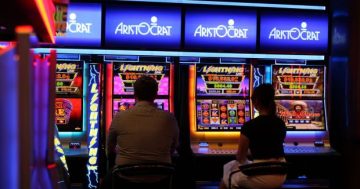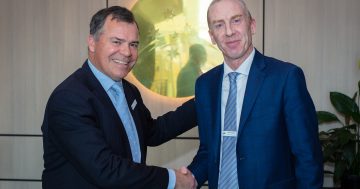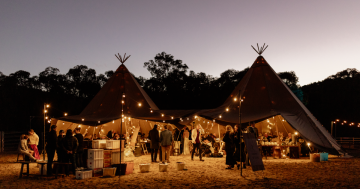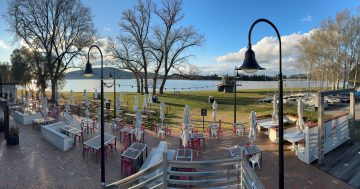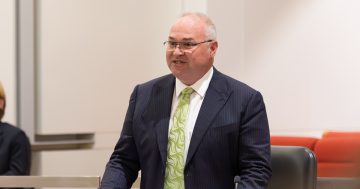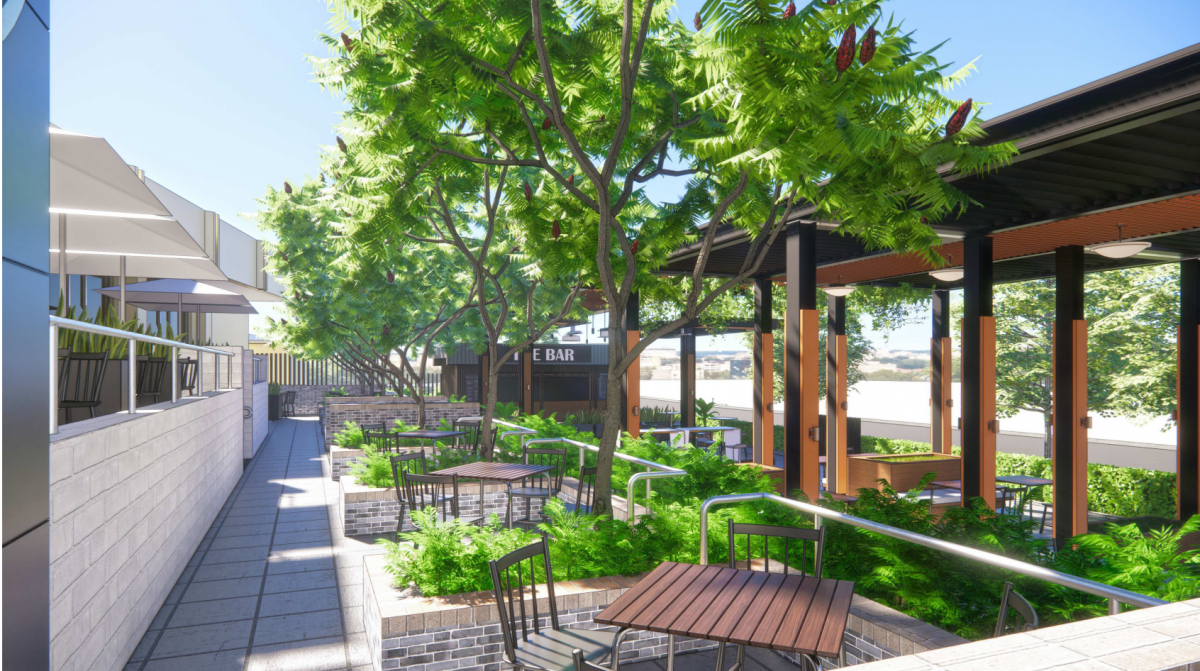
An artist’s impression of the new outdoor dining space at Canberra Southern Cross Club. Image: Canberra Southern Cross Club.
As part of the Territory government’s plans to reduce the harm caused by gambling, Minister for Gaming Shane Rattenbury has announced six ACT community clubs will benefit from the second round of Diversification and Sustainability Support Fund (DSSF) Tier 2 grants.
More than $950,000 in funding will go towards a number of projects across the six clubs, including the development of a conference centre, new kitchen and dining spaces, energy-saving initiatives and an indoor golf facility.
The grant, first launched in 2019, supports local clubs to reduce reliance on gaming revenue and develop alternative sources of income.
“More than $1 million DSSF funding has been made available as a result of joint contributions from the ACT Government and clubs,” Minister Rattenbury said.
“The government is implementing a gaming harm reduction agenda, working with clubs to reduce the number of gaming machines, and to introduce bet limits. An important part of this is helping clubs to transition to revenue streams that don’t involve gaming.”
Many of the community clubs looking to shift away from gaming revenue have opted to divest into hospitality and/or health and wellness. This is the case for Canberra Southern Cross Club, which has also operated the Stellar Canberra gym and fitness facility since 2018.
CEO Ian Mackay told Region the club planned to use its $100,000 grant to develop the Corrina Street frontage with a new outdoor dining area, which would be an “urban oasis” and provide some much-needed green outdoor space in Woden.
Mr Mackay said the new space would “soften” the club with a more attractive entrance, which he hoped would “increase patronage … and relevance to the community”, and that the expanded food and beverage offering would help diversify revenue streams away from gaming.
He said the outdoor dining area would be used for live music events – another way to draw in more revenue and appeal to a wider section of the community.
Mr Mackay said the Southern Cross Club had gradually seen a reduction in its reliance on gambling revenue in recent years. There had been a conscious effort to make this change, in order to “remain relevant and maintain our social licence”.
“It’s moved from around 55 per cent to about a third in the past five years,” he said, adding this was down to “deliberate activity from the club to move into other revenue areas”.
Southern Cross Club was also a recipient of the first round of DSSF grants in 2022, which it used to install electric vehicle chargers and solar panels at its yacht club.
Mr Mackey said the yacht club had been pokie-free since 2015, and now operated solely on food and beverage revenue.
The rollout of the DSSF grants comes as the ACT Labor and Greens government continues its efforts to reduce harm from gaming, with the aim of cutting the number of electronic machine licences in the Territory from more than 5000 in 2016 to 3500 by 1 July 2025.
Since March 2022, the government’s Surrender Initiative has provided a $15,000 incentive for each gaming machine authorisation surrendered by licence holders in the ACT, or $20,000 if the venue becomes pokie-free. At the end of last year, 70 authorisations had been surrendered under the scheme.
The recipients of this round of funding were:
- Canberra Labor Club – $150,000 to develop a conference centre at the Mercure Hotel, Belconnen as a new revenue stream.
- Canberra North Bowling and ACT Rugby Union Club – $200,000 to significantly upgrade kitchen and multi-purpose areas and install a new café.
- Canberra Southern Cross Club – $100,000 to develop the Corinna St frontage of its Woden club with an outdoor dining area. The space also meets an objective of the Woden Town Centre Master Plan to encourage buildings that help the streets and open spaces be safer and more welcoming.
- Croatia Deakin Soccer Club – $175,000 to redesign and rebuild the main entry, including installation of an airlock doorway to reduce running costs and conserve energy, and to fund installation of a lift to make the upper floor accessible to non-ambulant clientele.
- Eastlake Football Club – $150,000 to install solar panels at three clubs to significantly reduce running costs.
- Murrumbidgee Country Club – $200,000 to construct an indoor golf facility to extend the availability of lessons and practice ranges which would otherwise be restricted to fine weather and conducted predominantly in the warmer months.













